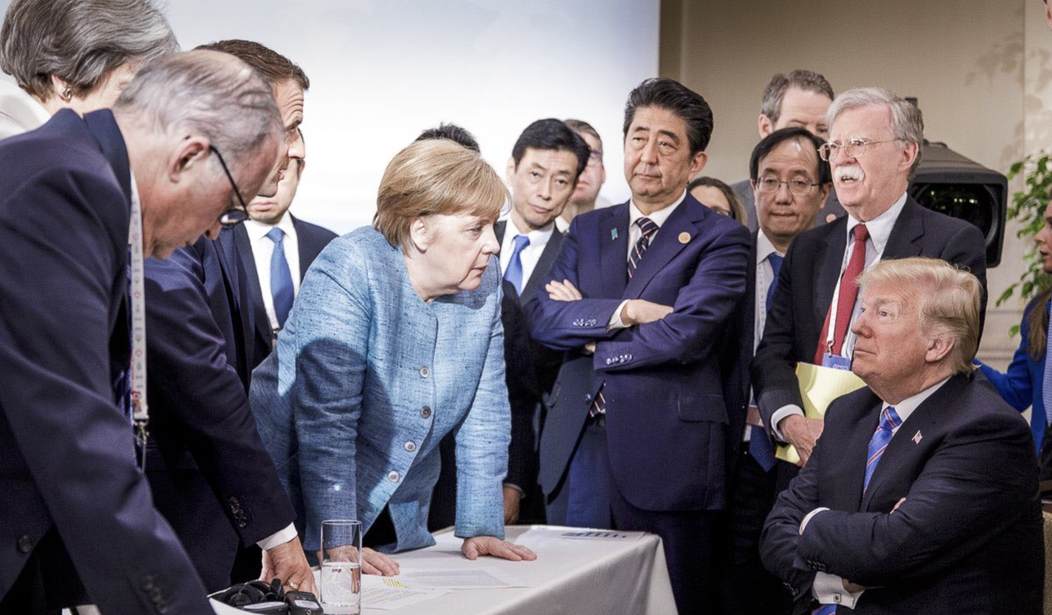Globalists get gleeful.
Joe Biden’s ascendancy to the United States’ presidency, highlighted by his sometimes shaky appearances in Europe in recent days, has reportedly pushed America’s popularity to new heights around the world.
According to new surveys by the Pew Research Center:
The election of Joe Biden as president has led to a dramatic shift in America’s international image. Throughout Donald Trump’s presidency, publics around the world held the United States in low regard, with most opposed to his foreign policies. This was especially true among key American allies and partners.
Now, Pew finds a significant jump in U.S. approval among 16 foreign populations. Take France, for instance. Please. Last year Pew found approval of the U.S. there had sunk to 31 percent. Presumably all because of orange man bad in the White House.
This year, however, Pew reports positive views of this country have surged to 65 percent. Presumably all because of the dementia Democrat in the White House.
Jumps of at least 25 percent in approval were also reported in Italy, Canada, the Netherlands, Germany, and Japan.
Confidence in the U.S. president has also varied sharply as foreigners make a sharp distinction between Trump and Biden.
Almost eight out of 10 Germans (78 percent), whose ancestors had the wisdom to freely elect Adolph Hitler as chancellor in 1933, today profess confidence in Biden to do “the right thing” in world affairs.
One year ago, only 10 percent expressed the same confidence in Donald Trump, who knows the difference between Syria and Libya and even between Ohio and Iowa.
Pew detected differences of at least 40 percent confidence in numerous other lands, including the Netherlands, Sweden, Belgium, and other modern tourist destinations for Americans. Biden and his Democrat Party strongly prefer, like, and work to buy that affection.
On Monday, Trump issued a reminder: “Those countries have taken economic advantage of the United States for many years—until I came along.”
This all raises the question – a crucial one in diplomacy – is it better to be liked or to be respected, even if that’s out of fear?
Now, you might ask, Who cares about such radical differences in national approval rates within countries that are the butt of surrender jokes and contain the buried remains of thousands of soldiers who were Americans’ ancestors?
The answer clearly is: No one really cares. Outside of media and members of a liberal world order seeking confirmation of their political wokeness and rightness.
Trump was a real threat to them. As he was to the political establishments of both parties in the United States. He espoused the radical idea that a U.S. president should, above all, protect American interests, security, and economy. America First was the label, which carried a faintly bad odor from 1930 isolationism.
But to Trump’s base and many other of their less political countrymen that made powerful sense, especially after two decades of another victory-free war ignited by a previous American commander-in-chief in the emotional aftermath of 9/11.
For the first time in NATO’s history, the mutual defense Article 5 was invoked and many allies sent troops to Afghanistan to rout the Taliban and support a feeble nascent democracy there in an historically fractious tribal land.
Even in 2015, Trump saw the ultimate pointlessness of such mission creep plus the political potency of ending it and vowed a troop drawdown there and elsewhere. And a welcome White House resistance to any new boots-on-the-ground military involvement around the world.
That was one of the numerous campaign promises Trump kept, along with creating millions of new jobs, tax cuts, deregulation, energy independence, restoring U.S. military strength weakened under the Obama-Biden administration, and crushing the ISIS caliphate.
Trump also demanded, rather firmly with loud complaints and implied threats, that some lagging NATO allies make greater progress toward their avowed goal of five percent GDP defense budgets by 2024. Some grumbled, but they did.
But this G7 summit was different with Biden who did not always seem mentally present
Those commitments may waver given Biden’s confused presence at the G7 summit and NATO conference. My Red State colleagues have assembled our coverage here and here.
“America’s back at the table,” Biden proclaimed.
France’s Emmanuel Macron responded in relief, “It is great to have a U.S. president who’s part of the club and very willing to cooperate.”
Presumably, such “cooperation” under a diminished but familiar Joe Biden also involves a return to America’s traditional financial largesse thanks to taxpayers, bountiful freebies, minimal complaints, and go-along-to-get-along “leadership.”
That would purchase Biden’s newly-inflated foreign approval ratings.














Join the conversation as a VIP Member